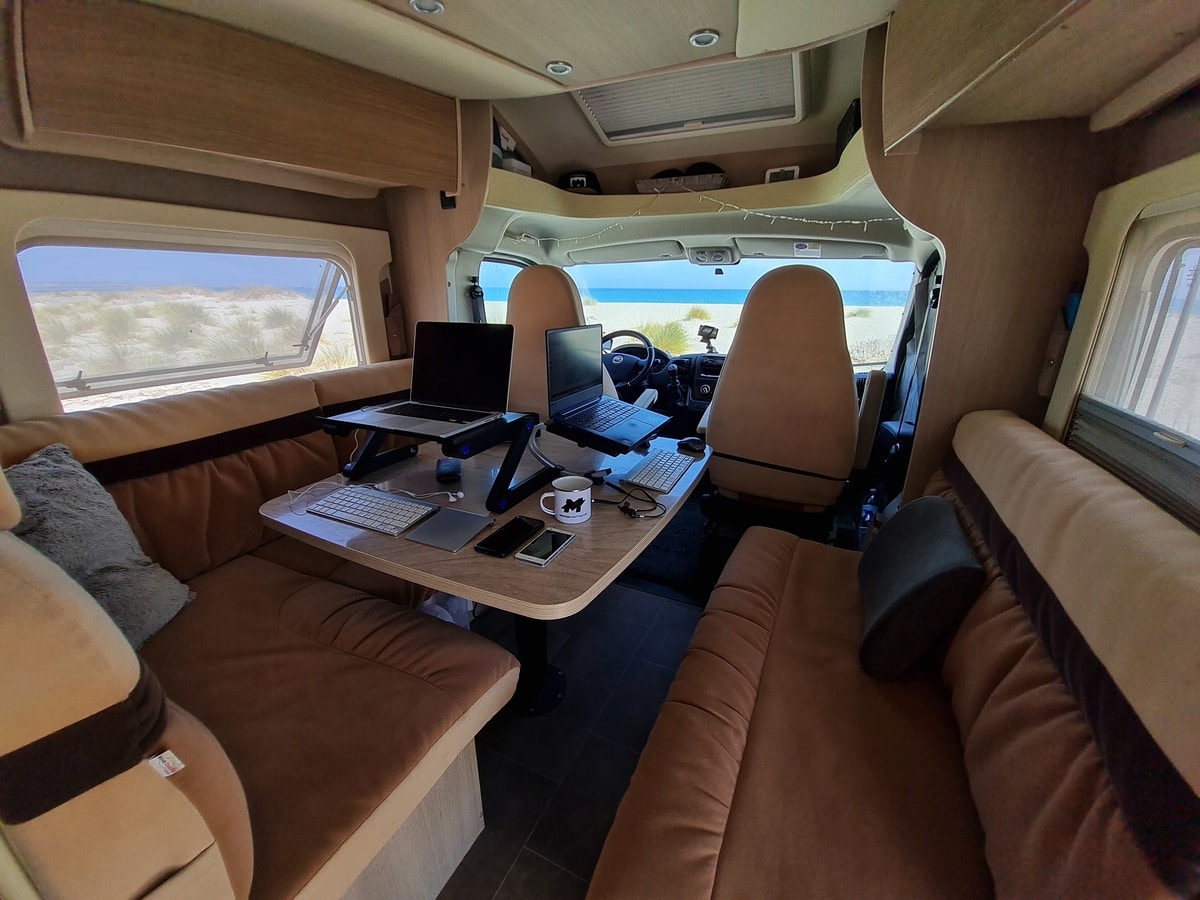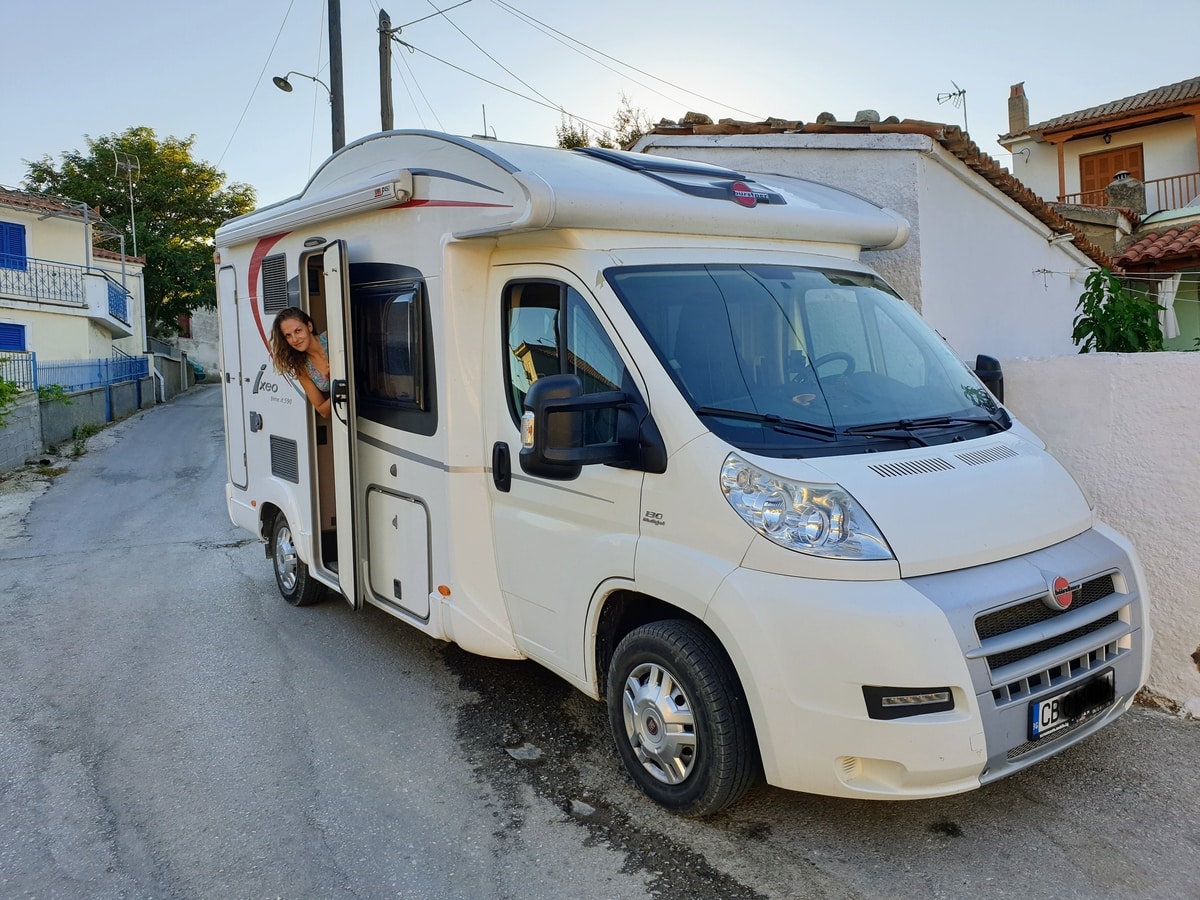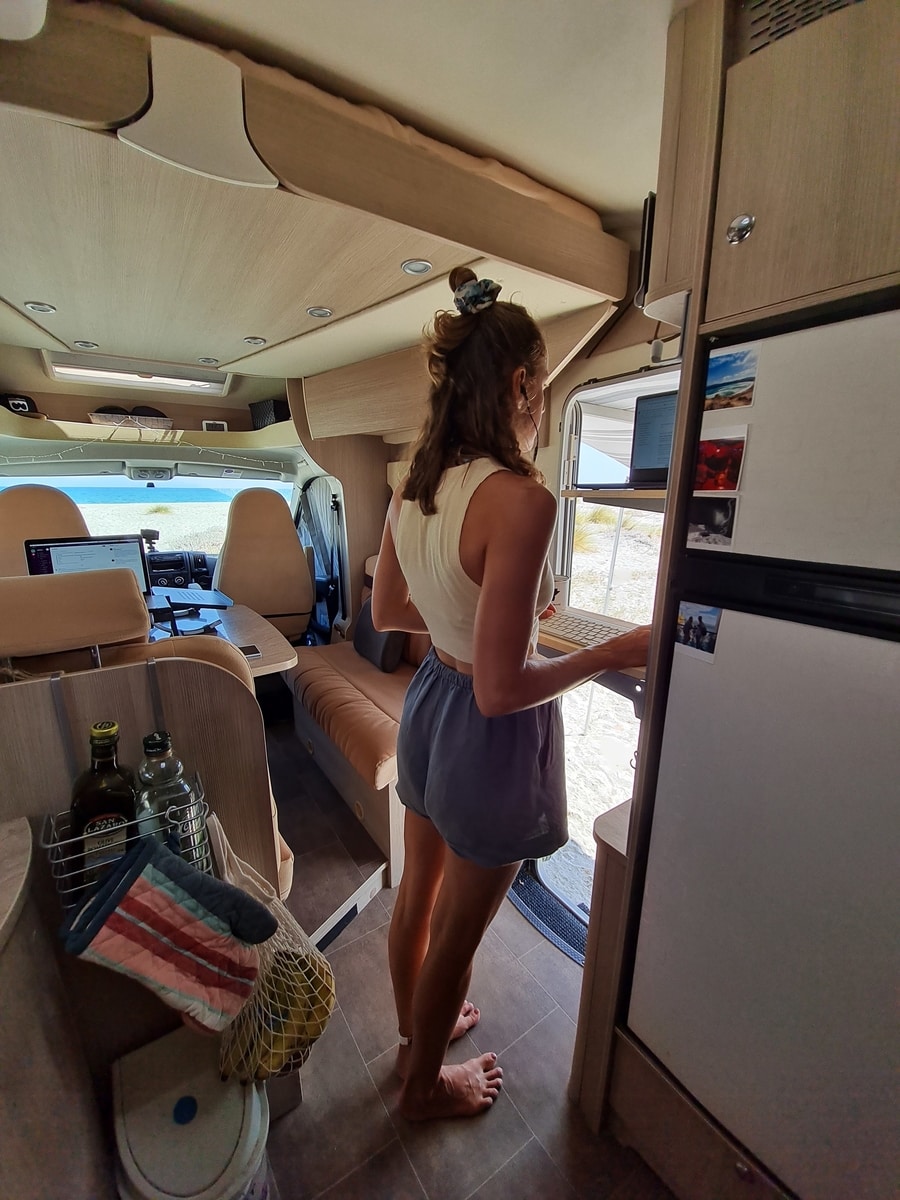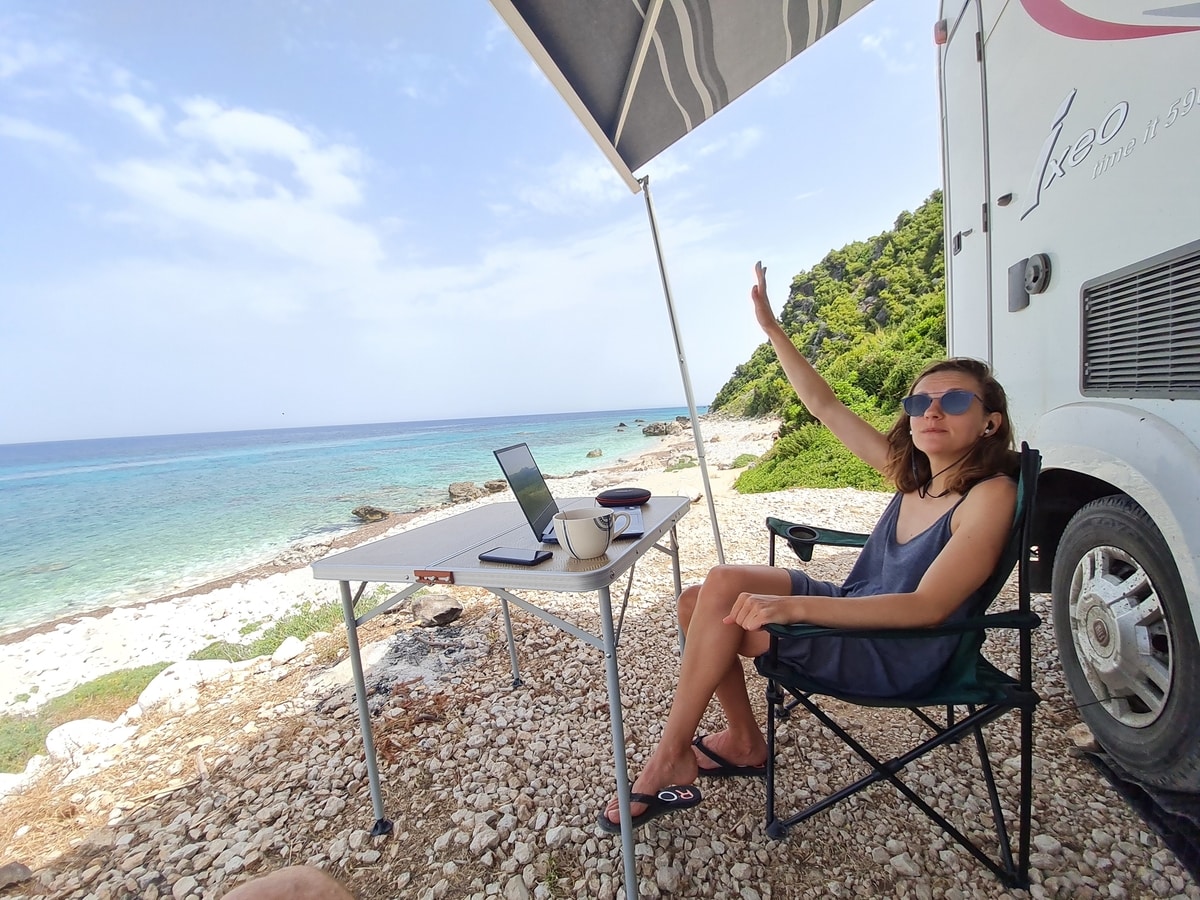Like millions of others around the world, you are probably thinking about how to make the most of the newly formed work situation. Your company has seen the advantages of remote work and is willing to switch to it permanently. Or perhaps you are a freelancer, a master of your own time and efforts. The van life hype has reached you even though you have not set foot on a campsite before. You are already following at least three people living on the road full time on Instagram, so you are just dreaming that one day you too will become a digital nomad. It is not simple but just go for it. It’s worth it.
If you can afford a motorhome, or you can afford to take a loan for it – you are halfway there. If you are looking for your purpose in life and know there is more to it than just work, living on the road and getting to know different cultures gives you a great perspective on the important things in life.
Working remotely
Working remotely as a Community Manager at Motion Software is definitely the greatest opportunity that has been offered to me. It also fits well with my lifestyle, interests, and beliefs and makes sharing the company philosophy a very easy job. There is nothing better than waking up next to the sea or underneath a breathtaking mountain peak and knowing that your source of income comes with you wherever you decide to go. Being able to be at remote places in nature, fully off-grid and still having everything you need with you – this is as nomadic as it gets.

Is living in a van the thing for you?
If you didn’t like what you read in the previous paragraph, this lifestyle is not for you. If you can strip off the status quo and the feeling that you have to live between four walls, be static and have your own place, then your home can come wherever you decide to go.
Here are a few steps to start from:
Step 1: decide whether the concept fits your lifestyle.
What is your type of personality? Do you like being outdoors? Do you like to step out of your comfort zone?
Step 2: you need to decide what you will use your van for
Consider whether you’ll use it to go on weekend trips, long holidays, or full-time living. It is important to know where you will be using it; at national parks; RV parks and camping grounds; or in the wilderness. What my boyfriend and I do – we are on the road, working and traveling for around 8-9 months of the year, so we chose our van considering we will be living in this tiny space for a long period at a time in secluded spots. Have a look at the different types of motorhomes the camping world is offering and get educated before you decide to buy.
Step 3: try before you buy.
The first motorhome you get will probably be a tester one. You will see a lot of things you need or want to change. I recommend renting different types of homes on wheels in order to decide which fits you best. We did this (and not just for holiday but also during the working week), and it was extremely helpful when choosing. We made lists of Pros and Cons for each camping option. This made it easier to decide on a combination of features that were important to us.
Step 4: if you want to try living on the road for a long period of time – get a motorhome.
We really wanted to do a camper van conversion. The idea of making your home yourself and to suit all your needs sounds really inspiring. However, the reality is:
- If you are working alongside a van conversion, it can take up so much of your time, a year in and you would still be doing it.
- When you start off you still do not know what you want or need, so it is a good idea to try out a fabric built as your first van before you start a long conversion process.
- We also thought of the option to stop working and do it for a month or two, but it would have cost us a lot more, in the long run, this way.
- You cannot know about everything – electricity, woodcraft, plumbing and so on, which makes the build really difficult. You need someone to help you with that, which of course adds to the conversion cost.
- Since the pandemic started, it has been extremely difficult to find a good van! It is a popular want! I was mainly looking at mobile.de for secondhand options, as well as the main distributors of VW, Citroen, Peugeot, or Fiat for vans returned from leasing. However, considering the restrictions in the tourism sector, everyone is looking for a travel van at the moment
- A van is a very tight space for full-time living, especially in terms of width. When you live and make a living on the road alongside your partner, you do need your space. It takes great travel compatibility to live full time in a tight van, always trying to squeeze past each other in the tiny corridor.
- There is limited space for a good-sized working station. You need to be comfortable in order to be productive and keep good discipline. I would say it also needs to be separate from the bed section. A lot of conversion vans have a seating area that makes up a bed at night. This is a big no-no for me. Your brain starts associating your bed with work, or your workplace with sleep.
- It is likely that the bed will take up way too much space, as a taller guy cannot fit in the width of the van, so you will need to put it lengthwise. Some conversion vans that could fit a bed width-wise are Fiat Ducato, Citroen Jumper, or Peugeot Boxer (all practically the same). Unlike the Mercedes Sprinter which is thinner and curvier, they have a more square shape and it is easier to build stuff inside.
- Not enough space for a large water tank for clean and greywater. This limits your camping options, especially in the wilderness, where you need quite a bit of water in order to stay off-grid for a few days.
- Small bathroom or none at all. You need a bathroom if you are planning on using this space for full-time living. Otherwise, planning where to take a shower will just be another task added to your To-do list.
- Not enough storage space– there are some pretty clever solutions to this issue. However, with a fabric-built motorhome, you are also most likely to benefit from outside storage. This is a very valuable asset, especially if you are an extreme sports fan with a lot of wet equipment at the end of the day.
- Small kitchen– who likes to cook in a tiny space?! Or empty the whole cupboard to get that can of beans at the bottom of it?!

Our companion on the road
We chose to get a used 2014- 6 meter motorhome Bürstner Ixeo (which is as long as the average conversion van) with a hideaway bed that becomes our ceiling during the day and reveals a huge sitting area with a large table big enough to take two laptops on stands and all the periphery you can think of for remote work.
It was extremely important for us to have enough space to work and move about inside since we also use it when we go skiing in the Austrian Alps in winter.
It cost me about 27 000 Euros. I paid some part of it upfront and took a loan for the remaining amount. Now I pay around 400 Euros per month on a 5-year plan to pay it off.
Pros:
- The Bürstner Ixeo is very small and therefore easy to drive and maneuver, especially in those small-town streets. Moreover, we have never had any problems getting to secluded spots, like wild beaches or up the mountain hills.
- It has a powerful engine and is not over 3.5 tonnes which means we can drive it at the speed limits.
- This van comes with a huge hideaway bed which doesn’t take space during the day and allows the camper to be the size it is while still having cool amenities.
- It has a large sitting area with a huge table.
- There is enough space to move about and go past each other.
- It has a large bathroom (something which most converted vans, campervans, or RV’s do not have). I have had at least 8 people sitting around in the camper, while I take a shower and get dressed in the bathroom, without them even realising I was there.
- There is also a massive fridge and a separate freezer. A big plus when trying to be in the wild for a few days!
- It is equipped with large water tanks, so you can stay off-grid for a long period of time, still have showers every day, and not run out of water.
Note: I don’t work for the brand and do not try to sell you a Bürstner Ixeo — it’s just sharing a personal story 🙂
What are the best practices for setting up a workstation while living in a van?
To make ourselves comfortable and have all that’s needed to work full-time remotely, we set up:
- A super clever stand-up desk, so we can change our position throughout the day. We put three storage consoles, on which we fit two shelves- one for our laptop and one for a keyboard and mouse.
- A second solar panel, so we can have enough electricity to charge everything even in the wintertime when there is not that much sunshine. Since we do not know much about electricity to trust ourselves with this task, we asked a guy maintaining campers to do it for us. This was important as we are most often camping off-grid rather than in an RV park.
- A booster– our technician installed a device that speeds up the charge when on the move. This is great when we drive smaller distances and we need to power our battery quicker.
- An older smartphone which we use as a router by putting a local sim card with Internet data. Around 50 cents per GB.
- Laptop stands and periphery, so we don’t slouch. A monitor is possible if absolutely necessary, however, I would say mainly in summer, as electricity can be limited during the winter. It can also be difficult to find a space for it.
- Ergonomic cushions, even the most basic one like this one can help your back stay straight.

Extra tips and tricks from my personal experience
- Use the Park4Night app — it is used by a lot of others like you who give feedback about different wild places or campsites.
- Mark spots that are good to stop and have a good internet connection on Google Maps (or just remember them for next time).
- Always park at a place with a nice view, so every time you look up from the screen you like what you see. This helps greatly with motivation. You know what you are doing it all for.
- Have a dedicated workspace that would not be a cause of distraction and slacking of work. It is good for it to be as separate from your sleeping setting as possible. You need to have a big enough table, which can fit a monitor, or a laptop stand so that you are comfortable throughout the day. Periphery in this case is also very important.
- On days on which I have a lot of calls, I always go to a place earlier to check the speed of the Internet and make sure I can react if there isn’t a good connection.
- In cases when I need to be downloading or uploading a lot, I always try to go to a nearby café and use their Wi-Fi connection, instead of our mobile data
What are the soft skills needed to make the most of this lifestyle?
Dedication
It takes a lot of dedication to not get distracted while working from a motorhome. Especially, while parked on a sandy beach next to turquoise waters.
However, at one point your mind knows this is the new normal and gets used to it. It is still beautiful, you do not take it for granted, it is just happy every day.
Planning
You do need some good planning in order to get done as much work as needed. You need to combine your working and “camper” schedule.
Maintenance
Living in a home on wheels does involve a fair amount of maintenance that you need to do every day, such as filling up freshwater, getting propane, or emptying your toilet at a dump station. So, planning on when you will need to do these, do a grocery shop or your laundry needs to be in accordance with your tasks and meetings at work. This goes of course together with your time management skills. Probably the most important thing when living and working on the road full time. If you want to be able to do everything, then you need to be organized.
There will always be loads of cool activities to do around. The fact that my role at Motion Software solely preaches this work-life balance philosophy makes it so worth living for.

More benefits to living on the road full-time
- The minimalism – it is so inspiring and freeing NOT having so much stuff. You have the bare minimum and you do not need more, trust me.
- You learn to live a lot more sustainably – appreciation for the natural world is a lot greater than before. We have switched to everything biodegradable and use very little water. We also always recycle and do not use plastic bags when we shop.
- Creativity – you get super creative about storage ideas and little builds around the camper. For example, we mounted some hooks on the walls, to keep our broom and mop in place while we drove. We also built a shelf in our outside storage, so we can set up a pantry, which we can access easily from the inside too. We also got a really cheap shelf rack for our wardrobe, in order to keep our clothes separated and neatly folded.
- You never forget anything – your house goes where you go, nothing better than that.
- Nomad Community – you meet a lot of people on the road, all interesting and diverse. Also, working in a remote environment gives you a virtual network of like-minded individuals who like to share experiences and knowledge about the world, since this is in the essence of being remote.
I could go on… living in a motorhome full time is a long and interesting process- you find out new things every day. If you can work remotely, you are open to an alternative lifestyle and are willing to get closer to nature, you can totally do this. I have wanted to start living like this for a long time. Now, looking back I am very thankful for the longer discovery process I went through until I reached a solution I am happy and comfortable with. Having someone who is willing to share this journey with me makes it even more special. Life is an adventure- embrace the journey.

